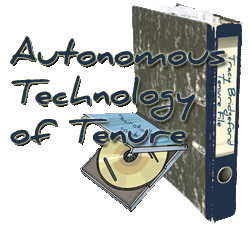

From a purely technological perspective, Kairos can be seen as a computer screen in a web browser under which a seemingly invisible man behind the curtain of code controls its presentation and content. And from this purely technological perspective, technorhetoricians can be seen as techies. The more we identify with the content of Kairos, and the more we fraternize with other technorhetoricians, the more we can expect to be thought of as (what my friend and colleague from Michigan Tech, Allan Heaps, used to call) the PageMaker Guy. The PageMaker Guy is a person who demonstrates expertise with a particular technology; a person designated as the, and apparently, only expert to the point that those she helps don't even try to learn the technology for themselves; a person who spends most of her time helping other people fix their technological problems so that she has no time for her own work; and a person recognized only for her technological expertise. But like Jerz's design critique, this perspective articulates only Kairos's visible presentation and not the essence of its identity or the thoughtful editorial processes with which technorhetoricians engage when bringing Kairos to publication. Nor does it tell us what Kairos is about, what it means.
To find out, let's begin the dismantling process. As a method of inquiry, dismantling seeks to "take apart" a technology in order to recover "the buried substance" of discovery by creating a "space and opportunity for learning" (Winner, 1978, p. 331). As we begin dismantling, we should consider first the "most interesting parts of the technological order[,] … not the physical apparatus … but the 'forms of life' —patterns of human consciousness and behavior adapted to a rational, productive system" (p. 331). These forms of life, he says, include "(1) the kinds of human dependency and regularized behavior centering upon specific varieties of apparatus, (2) the patterns of social activity that rationalized techniques imprint upon human relationships, and (3) the shapes given everyday life by the large-scale organized networks of technology" (p. 331).
The forms of life shaping Kairos's identity
include the Internet, the World Wide Web, and for my discussion
here—tenure. Ultimately tenure is proof, or certification,![]() 5 that
a candidate has contributed significantly to scholarly discussions
that in turn build knowledge about a topic. To do so, the candidate
must publish original work that is then reviewed by more experienced,
already tenured, scholars—first
with the dissertation, later with juried articles or in
some cases a book. In this academic world, the truth is one must
publish or perish. If one publishes, she then gets to participate
in activities attached to reappointment, promotion, and
tenure review. In that context, she is then part of the
system that shapes others' tenure-track lives.
5 that
a candidate has contributed significantly to scholarly discussions
that in turn build knowledge about a topic. To do so, the candidate
must publish original work that is then reviewed by more experienced,
already tenured, scholars—first
with the dissertation, later with juried articles or in
some cases a book. In this academic world, the truth is one must
publish or perish. If one publishes, she then gets to participate
in activities attached to reappointment, promotion, and
tenure review. In that context, she is then part of the
system that shapes others' tenure-track lives.
But the story of tenure is not a terribly exciting story to tell; it really only becomes interesting when it is in question. The system of tenure looks the same today as it did in 1820 when it was established that "tutors," after a probationary period of six years, either left the university or were promoted to professor (Elliott & Chambers, 1934). From an institutional perspective, the system of tenure, as Fred Kemp (2000) in "Zen and the Art of Tenure," explains it, "protects academic freedom, preserves the stability of knowledge, and promotes excellence in faculty," but, he adds, "what tenure really does, of course, is encase the status quo in a protective shield of bureaucratic processes that can, in effect, give carte blanche to mediocrity" (p. 110). I like Kemp's brutal honesty but hope he is wrong when he says that what tenure is really meant to do is "exclude people like you and me from challenging the presumptions and power of the already tenured. Tenure thrives upon conformity and predictability" (p. 109). Of course he isn't wrong. And when he situates himself within the same context with the phrase "you and me," I understand he means those who work in and study online environments like technorhetoricians.